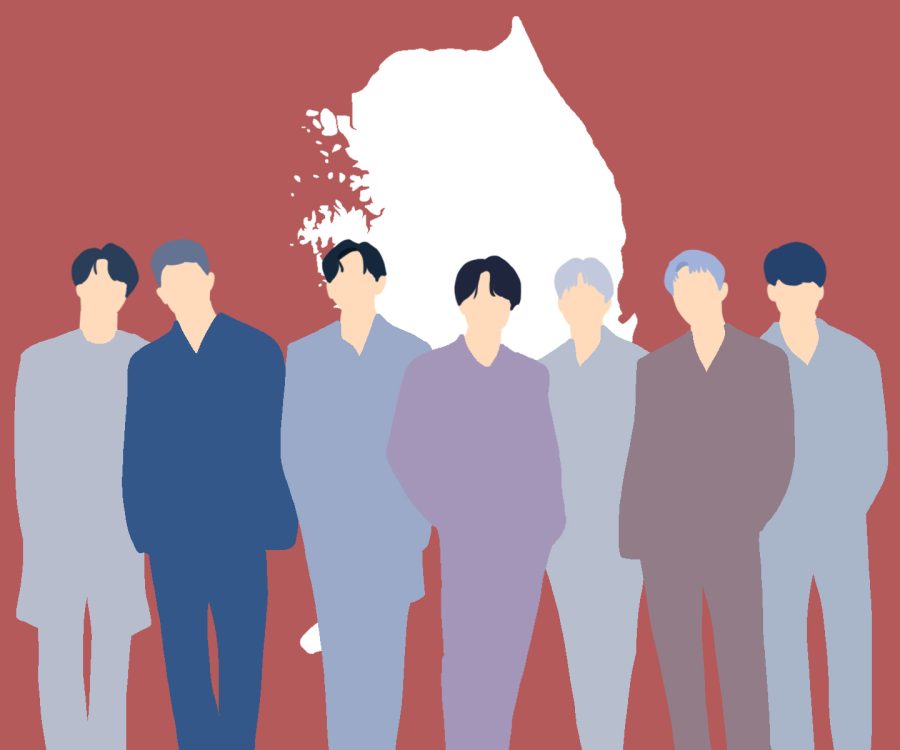If there is one thing fans of prominent Korean pop group BTS do, it’s back their boys.
With the recent confirmation of all seven members hiatus from music in order to serve their required two years of military service, fans remained loyal in light of the announcement.
While the group plans to reunite in 2025 after all members complete their duty, the announcement effectively settled the dispute regarding whether or not the band should receive exemptions for their musical achievements.
Under South Korean law, all non-disabled men are to serve a minimum of 18 months in the military by age 28. However, athletes, musicians and artists who exhibit global excellence, such as professional soccer player Son Heung-min have received exemptions.
Outside of South Korea, 48 other countries require mandatory conscription, meaning those within a certain demographic have to enlist within the military. The vast majority of countries with a draft often require males to serve a minimum of two years between the ages of 18 and 30.
The band’s eldest member Kim Seok-jin, better known as Jin, received a two-year delay in his service when he turned 28 back in 2020, partially spurring the recent announcement.
However, even with exemptions, individuals such as Heung-min still complete their required service.
CedarBough Saeji, assistant professor of Korean and East Asian Studies at Pusan National University, explained how military service runs deeper than being an act of civic duty.
“In Korean society, going to the military is becoming a man,” Saeji said. “Like they [BTS] haven’t gone yet and there are still Korean people who still think of them as kids, they are not adults. And they go to the military, and they come back and it’s like, OK, now you’re a man.”
Notably, the group did not attempt to avoid conscription, with government officials initiating the conversation regarding their exemption. Rep. Sung Il-jong of the main opposition People Power Party proposed a bill absolving service for men who prompted countrywide prestige.
Beyond South Korea, other notable musicians who also experienced the effects of the military service range from Elvis Presley, Willie Nelson and Johnny Cash.
“If members of BTS didn’t go, they would literally have to spend the rest of their lives justifying not going,” Saeji said.
Yet, many speculated whether or not the boyband would receive immunity based on their economic contributions to South Korea’s economy. In 2018, the Hyundai Research Institute stated that BTS was responsible for more than $3.6 billion to the country’s economy, the equivalent of what 26 midsized companies nationally contribute.
Furthermore, analysts have projected that BTS would have provided over $29.4 billion to the economy between 2014 and 2023.
However, Saeji explained how little the country’s artistic production compares to other forms of revenue within South Korea’s economy.
“When we’re talking about cultural content and export of cultural content, almost 60% of the money is made by games, K-pop only makes 7% of the exports of cultural content,” Saeji said. “It [BTS hiatus] is not going to stop tourism, it’s not going to stop money coming in from all of these things they already produce.”
Fans of the group, also known as the “ARMY,” have expressed a mixture of reactions to the band’s temporary departure.
Jay Zamiska, a senior at DePaul and a member of the university’s K-pop Dance club, applauded the group’s decision to go forward with their service.
“I’ve been into K-pop for eight years now and have followed BTS the entire time,” Zamiska said. “I always knew they’d enlist, especially before they were the sensations they are today. Even if the government made things optional for them, they’d want to serve since being in the military is more than an obligation to most Korean citizens.”
Despite South Korean celebrities almost always serving noncombatant roles within the military, many idols have struggled with assimilating to their new demands and expectations. Most notably, Yoo Seung-jun, one of the country’s biggest pop stars in the 2000s, attempted to obtain American citizenship to avoid service.
“While some may argue that they were coerced or forced into service, I think they’re following in the footsteps of previous idols and proving they don’t think of themselves as better than others due to their status,” Zamiska said. “At the end of the day they are South Korean citizens, and it is admirable of them to enlist.”
DePaul junior and casual BTS fan Olivia Martinez expressed initial astonishment at the announcement.
“I was surprised when I first heard that some of them aren’t exempt,” Martinez said. “I would think because of how globally huge and how culturally impactful they are, the government would exempt them from going.”
Since its 2013 foundation, BTS has broken over 20 Guinness World Records, from being the first K-pop group to reach the No. 1 spot on the Billboard 200 charts to producing the most streamed track on Spotify within 24 hours.
Although the group’s hiatus may seem sudden, Martinez remained adamant that no matter where the band’s future takes them, their fans will always remain.
“I believe that the ARMY will be there for them when they come back because of BTS’s impact on them,” Martinez said. “Plus, the ARMY has a lot of content on the internet to remember and reminisce on while they wait.”
While the future of the K-pop sensations remains unclear, it is evident that their estimated 90 million fans will remain loyal to the band, no matter when they decide to return to the stage.
“There’s like an incredible belonging-ness that’s gonna come out of this, and hopefully nobody is gonna violate their [BTS’s] privacy,” Saeji said.




